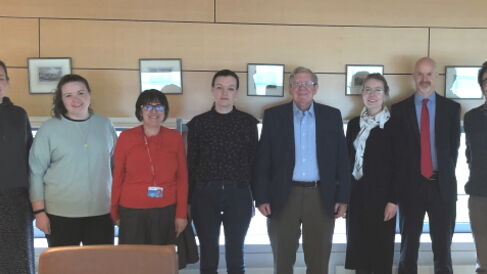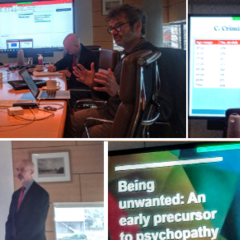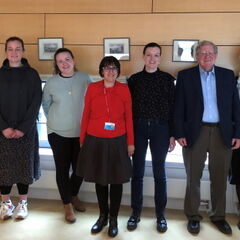
On Friday 21 January 2022, the Institute of Criminology (IoC) hosted a workshop to mark the 60th anniversary of the Cambridge Study of Delinquent Development (CSDD). The workshop brought together selected new research based on this unique study. It started with an introduction by Prof Manuel Eisner, Institutional Host of the study.
Prof David Farrington, co-director of the study, gave a talk entitled: “The Cambridge Study in Delinquent Development: 60 years later”. Prof Farrington joined Prof Donald West, who initiated this landmark study in 1961, in 1969 and became its director in 1982. His talk highlighted the dramatic differences in the data between self-reported crime and convictions, and how childhood risk factors, such as parental neglect, harsh discipline and convicted fathers and mothers had a strong impact on the individuals involved in the study (Generation 2 and Generation 3).
Prof Jolliffe, University of Greenwich, co-director of the study, presented “The Promotive Impact of Personality on Self-Reported Offending”. He initially got involved in the study as PhD student of Prof Farrington and his talk focused on personality traits and crime.
Dr Katherine Auty gave a talk entitled “The Relationship between Testosterone, Criminal Behaviour and Psychopathy in a Prospective Longitudinal Community Study”. The insights were derived by interviews of a sample of Generation 2 at age 48, as testosterone decreases during the ageing process.
Dr Henriette Bergstrøm, University of Derby, delivered the last presentation entitled “Being Unwanted: An Early Precursor of Psychopathy”. Her talk centred on illegitimacy, parental neglect, failure to bond and attachment issues between mother and child, as early as during pregnancy, which can put a child at risk of developing psychopathy at a later stage.
Prof Eisner ended the workshop with some concluding comments. You can watch a video of the workshop that includes all the talks at https://youtu.be/qcpi9iCYmI0.
The CSDD project
The Cambridge Study of Delinquent Development has been following the lives of 411 South London males since 1961. It is a landmark study in Criminology, begun by Donald West and continued by David Farrington for many decades.
Farrington, D.P., Jolliffe, D. & Coid, J.W. "Cohort Profile: The Cambridge Study in Delinquent Development (CSDD)". J Dev Life Course Criminology 7, 278–291 (2021).https://doi.org/10.1007/s40865-021-00162-y
Abstract
The Cambridge Study in Delinquent Development (CSDD) is a prospective longitudinal study of 411 London males who were first assessed in 1961–1962 at age 8–9. The main aim of the CSDD is to study the development of offending and antisocial behaviour from childhood to adulthood. The males have been interviewed nine times from age 8 to age 48, and they have been searched in criminal records up to age 61. Their parents, children, teachers, peers, and female partners have also been interviewed. Numerous childhood, adolescent, and adult factors have been measured, including individual, family, and socio-economic factors. Up to age 61, 44% of the males were convicted of criminal offences. The CSDD has advanced knowledge about criminal careers, risk factors for offending, the life success and health of offenders, and the effects of life events on the course of development of offending. The CSDD shows how a combination of childhood adversities tends to lead to a combination of adult adversities including offending. Early prevention programmes are needed to interrupt this development and reduce the intergenerational transmission of offending and antisocial behaviour.


